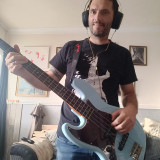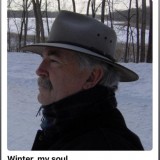I don't get one thing...
-
sktn
11 years agoI didn't want to make a new thread, but the old one http://www.poems-and-quotes.com/discussion/topic.html?topic_id=133399 which I accidentally found with google cannot be bumped. Not even sure it's the right forum, but since it's a theoretical question it should be the right place.
I didn't really get this part. I dunno who are those 'we' but they have some weird idea.
*********************************************************************************
"We consider a rhyme to be forced:
1when the arrangement of words is twisted around to put a rhyming word at the end of a line when it would normally be in the middle of the line somewhere,
2.when a person extends a line beyond reason to put a rhyming word at the end of the line,
3.when a person uses a tone inappropriate for their poem to get a rhyming word,
4.when a person inserts a line that doesn't really go anywhere or mean anything to get a rhyme for another line, etc.
For instance:
1. I love you more every day that I live.
If you were in trouble, my life I would give.
This is not normal speech. Normally we would say 'I would give my life if you were in trouble.' "
*********************************************************************************
What's wrong with using unusual word order per-se? I mean, that couplet doesn't really look nice, but the cavil to "This is not normal speech" in poetry... It's not even the direct speech there. Should I quote here countless lines, from, say, "Paradise Lost" written in highly unusual word order, to fit not even the rhyme but simply the meter?
*********************************************************************************
"O now in danger tried, now known in arms
Not to be overpowered, Companions dear,
Found worthy not of liberty alone,
Too mean pretence!"
*********************************************************************************
Definitely looks forced, that's not normal speech. Or what from Coleridge, even worse, not only people don't speak that way, he invented some "wel-a-day" word to rhyme with "say":
*********************************************************************************
"And in her arms the maid she took,
Ah wel-a-day!
And with low voice and doleful look
These words did say:
In the touch of this bosom there worketh a spell,
Which is lord of thy utterance, Christabel!"
*********************************************************************************
So, what do I miss here about the "forced rhyme"? -
Darren
11 years agoI agree with your point about 'normal speech'
If we want to write using normal speech then we should stick to prose.
My impression is that Poetry has no boundaries, I believe it moves in cycles of what is on trend.
(I hate that term 'on trend')
Rhyming poetry seems to be unfashionable at the moment. Spoken word or Slam seems to be the headline grabbers out there currently.
A lot of reviewers use the term 'your rhyming was unforced' on here.
That means as Robert states that the chosen words were in keeping with the tone or theme of the poem.
However you have to ask this;
What would Spike Milligans poems look like with unforced Rhyme or correct speech? -
Larry Chamberlin
10 years agoWhen I think of forced rhymes and how clever poets get around it I always hearken back to Bob Dylan.
He had a knack of reversing the embarrassment. He would put the unusual rhyme or phrase first and the normal speech after, making the poem/song seem as though it were "healing" the message.
"your magic swirlin' ship
My senses have been stripped,
my hands can't feel to grip"
"Mr. Tambourine Man" -
Larry Chamberlin
10 years agoRhymes will always be fashionable to a great many people. Free verse may have passionate advocates but don't let that dissuade you.
-
Bob Shank
10 years agoWhatever works, never change your style, thought process or arrangements because someone doesn't like it, if it adds quality to the poem itself, then consider it, but in essence all rhyming poems are forced, just some more creative than others....song writers do a lot of slant rhyming and can take two words that don't rhyme and make them rhythmic ....
-
Maple Tree
10 years agoI have tried so many times to rhyme. I don't seem to have a problem when Im writing a Sonnet or a formed poem with a rhyme scheme, but to write a rhyme poem.. my word choice sounds ridiculous and I end up posting it in the funny poems section.
-
donna
10 years agoI find it difficult to write poetry that doesn't rhyme. Probably because my lack of knowledge on what makes a poem without rhythm. If I try, it becomes a story or an essay in my eyes.
That is not to say I don't like reading poems that do not rhyme. I just find it easier to find the flow of a poem when it does. -
Larry Chamberlin
10 years agoDonna,
I agree that many free verse poems are more prose than poem.
Entirely in my own conceptualization of what poetry is:
Line: I believe the line is important, whether it has rhythm or rhyme is only a factor. The line should contain a thought, not just part of a run on sentence, but a whole thought in itself. Moreover, each line should lead to the next line as thoughts in a rumination, a baring of the soul or even a day dream.
Stanza: The stanza is one whole part of a monologue or dialogue. It has a beginning, development and an end, like a paragraph. Unlike a paragraph each line should make you understand a single concept. Taken as a whole, the stanza suggests something more: perhaps it is a paradigm, perhaps nothing more than an opinion, but is a separate chapter of the work.
Poem: The whole poem to me a a dialectic. It subtly or obviously presents an issue, be it some concern about a relationship, a choice that must be made, reminiscing about an event, or the quiet observation of a scene, or anything else. There is an answer to the issue, either by developing it, countering it, setting up a tangential movement or such. Finally, there is a resolution, a synthesis or conclusion. The issue is now fully presented in a manner that takes the reader on a journey - emotional, intellectual or intuitive.
What makes it different from prose, in my world, is that you could not possibly speak this poem in normal conversation. It requires attention to each line, to each stanza. It demands recognition that the concept is broken down into parts which must play against each other. The use of rhyme and rhythm is an aid to this purposeful deconstruction of communication, but neither is a requirement in itself.
All of these thoughts are wholly my own and I do not in the least claim to be an expert.
Moreover, the exceptions to this process are quite often more poetic than the slavish adherence to it. -
Milly Hayward
9 years agoI am new to poetry writing and trying really hard to change my way of writing. Trying to write without rhyme, short tiny poem styles but they don't feel comfortable to me.
If I try and write without rhyme my poetry it doesn't work. Without rhyme what I want to say gets lost and blurred and doesn't seem like a poem to me anymore.
Yet reading other peoples none rhyming poetry does make sense and is often the most amazing beautiful poetry.
I don't have the energy or concentration to count stanzas or work out syllables and feet and do all of those things and be creative. So I have to just do what I can which is concentrate on sharing thoughts in as poetic way as possible.
Like drawing a picture you draw the best that you can and then work on it until you can do
no more to it.
Its the same when writing stories. I can write outlandish stories that have beginning middle and end that flow from my mind, an unravelling exiting journey from one word to the next but I cannot plot it all out or plan it in advance because too much plotting and counting is premeditated and it kills all of the creativity in my bones.
So I think I'm stuck in my own way of being creative but I don't think that's a bad thing because on this site I have found a few people who like what I write and that makes it all worthwhile. It means that what I write is worth writing.






